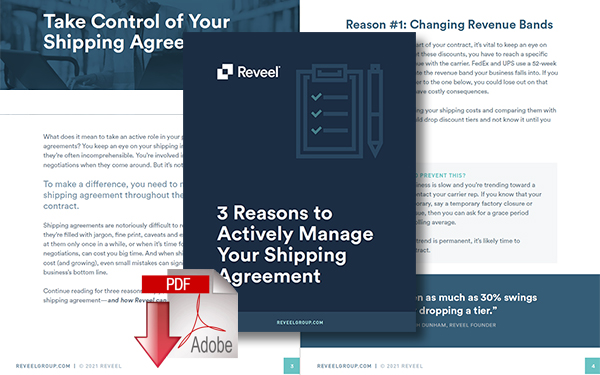Understanding Your Shipping Contract & Your Carrier’s Responsibilities

Understanding what both you and the carrier are liable for is essential to your compliance and your bottom line, so let’s take a look at these carrier contracts and where your carrier’s responsibilities lie.
Carrier Contracts and Your Carrier’s Responsibilities
When it comes to shipping contracts, the specifics of your and your carrier’s responsibilities may be detailed in between a bunch of legal jargon that’s difficult to sift through. Understanding what both you and the carrier are liable for is essential to your compliance and your bottom line, so let’s take a look at these carrier contracts and where your carrier’s responsibilities lie.
What are Shipping Contracts?
We’ve discussed shipping contracts, also known as carrier contracts, many times here on our blog, mostly detailing when to renegotiate your contract and some of the best tips going into a negotiation.
However, it’s time we provide the simple definition of this contract for those who are new to the field: shipping contracts are the legal documents between parcel carriers and shippers that detail the responsibilities, liabilities, rates, and variable fees associated with the shipping of packages between the two parties. This binding agreement also details when liability transfers from the shipper to the carrier and what will happen in case of damage, loss, or late delivery of the applicable shipments.
Your Responsibilities as the Shipper in a Carrier Contract
It’s a common misconception that shipping contracts only detail the terms and conditions the parcel carrier is to adhere.
These documents detail your responsibilities and when you’re liable as the shipper, just as much as the other party. Let’s first look at some of the most common terms laid out in these carrier contracts that impact you and your process.
Provide Accurate Data
When working with any parcel carrier, the first thing you do with any shipment is provide the carrier with data about the package you’re shipping with them. This shipping data is vital to getting your packages where they need to go safely and on time.
While individual package data must be accurate, high-volume shippers in agreements with carriers are often also required to maintain and submit a manifest of all the packages the initial driver is taking into their possession. This allows drivers to save time by not scanning hundreds of individual shipping labels with each pickup.
Supply Necessary Permits & Ensure Compliance
If you work with hazardous, dangerous, or otherwise special-care goods, your carrier contract will likely include terms regarding permitting and applicable compliance standards.
In these instances, it’s your responsibility to ensure you have the proper permit, packaging, and documentation of the appropriate shipment before handing it off to the carrier.
It’s also likely that carriers will include shipping volume stipulations in your contract, so that’s another area you, as the shipper, will need to ensure you’re complying with each year. If you neglect this area of your shipping contract, your carrier may revoke your discounts, deny your reimbursement claims, and even request to modify your pricing structure to their benefit.
Adhere to Packaging Requirements
While your contract will require your compliance with a variety of volume, distance, or other requirements, the same notion of compliance can be applied to all packages given to your carrier.
Carrier contracts often include stipulations requiring shippers to use the proper packaging for each type of good, adhering to certain weight limitations and the proper reporting of that weight, and a variety of other aspects, depending upon the goods shipped.
The Carrier’s Responsibilities in the Shipping Contract
Parcel carriers have a variety of responsibilities they must uphold, even outside of shipping contracts.
However, the agreements they enter into with high-volume shippers expand upon this, detailing when they’re liable and other terms and conditions that, if broken, can mean money back in your pocket.
Take Possession of Shipments
Your parcel carrier claiming possession of your packages is the first step to getting them where they need to go. While you will need to fulfill a few obligations before your carrier can accept your shipment, once done, the carrier will then be liable for what happens to your parcel from then on.
After picking up or receiving your shipment, the driver will deliver everything to the appropriate depot where packages will be shipped based on the destination, applying the service level dictated in your carrier contract.
Maintain Packages During Shipping
Once on the road or in the sky, your carrier of choice will be responsible for the condition and safety of your shipment during transit. Depending upon the terms in your agreement, they must utilize proper shipping and handling methods, as well as storage facilities when not actively in transit.
Be aware that some of these responsibilities may be contracted out to another third party, like a loader or storage provider, but your carrier will still be liable should something happen outside of your control.
Deliver Shipments Accordingly
Once parcel carriers have your packages in hand, they are then liable for the safe transportation and proper delivery of those packages, based on the terms and conditions of your carrier contract and the needs of that particular package. This can include anything from the guarantee of a signature upon delivery, redelivery attempts, utilization of the proper mode(s) of transportation, and more.
Whether you’re renegotiating your current carrier contract, or you’re entertaining a shipping contract with another parcel carrier, it may be time to consider adding another tool to your everyday shipping logistics resources. At Reveel, our business intelligence platform uses your data and our machine-learning technology to help you get the best deal possible with your parcel carriers.
Contact us to schedule and;
Related Resource
3 Reasons to Actively Manage Your Shipping Agreement
In this ebook, we dig into why you should actively monitor your shipping agreement and see how a Shipping Intelligence Platform can help you solve them, we also explain the three key reasons you should stay on top of your shipping agreements Download Now!
More Reveel Resources
Related Article: What to Expect from the Duopoly of FedEx & UPS General Rate Increase in 2023
Article Topics
Reveel News & Resources
Reveel Expands Shipping Intelligence Platform with New Parcel Carriers Integration Direct-to-Consumer Beverage Distributor Optimizes Fulfillment Operations How A National DTC Beverage Distributor Increased Savings With Active Shipping Management The Crucial Importance of SOC 2 Certification in Today’s Digital Landscape GRI Impact Analysis – Parcel Spend Management 1.0 vs. 2.0 Reveel’s Shipping Intelligence Platform Transforms MFCP’s Shipping Operations Ship Your Yoga Essentials Effortlessly with Reveel’s Shipping Solutions More ReveelLatest in Transportation
UPS Cuts Email Response Time in Half with AI Automation Five Innovations Shaping the Future of Last-Mile Delivery Barge Hits Texas Bridge in Incident Reminiscent of Baltimore Collapse Freight Shipments Continue Downward Trend in April Record High in Container Production Expected for 2024 VIDEO: Baltimore’s Francis Scott Key Bridge Demolished in Controlled Explosion USPS Sees Increase in Revenue but Overall Net Loss in Q2 More Transportation
















